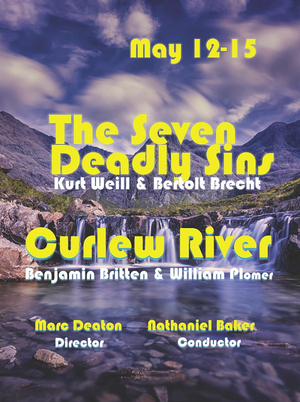Review: THE SEVEN DEADLY SINS AND CURLEW RIVER at Madison Lyric Stage
Madison Lyric Stage Presents Double-Feature of Two Rare Modern Operatic Works

Nestling in the woods behind the Historic Deacon John Grave house, is a community theater bursting with talent. Last Saturday, I attended Madison Lyric Stage's 10th season-opening double-bill featuring The Seven Deadly Sins (Music by Kurt Weill) and Curlew River (Benjamin Britten, composer). I was looking forward to seeing Madison Lyric Stage for the first time, but I must admit my hesitancy: To put it gently, Kurt Weill and Benjamin Britten are not my favorite composers and I worried that I wouldn't appreciate these two modern operatic works. I braced myself, knowing that they were designed for a discerning palette beyond my reach, yet I left the experience thoroughly impressed and invigorated by the performances.
The stage is set in Madison Lyric Stage's brand new tent just behind the Deacon John Grave house. When I first heard that we'd be attending a performance in an outdoor tent on a rainy day, I expected disaster and got my galoshes ready. I arrived and was more than pleasantly surprised to discover that Madison Lyric Stage has thought of everything and made a truly impressive and innovative space. The hard-sided tent includes flooring, quality padded chairs, a raised stage, a professional-quality lighting and sound system, a projector with screen for surtitles, a bar, and seats 75 guests. Listening to the music and hearing the light rain drops on the top of the tent the performances that much more profound, somehow. It was such a unique, high-quality experience that I look forward to attending more of their outdoor productions.
The opening performance of the evening was The Seven Deadly Sins, the last of many collaborations between German-American composer, Kurt Weill (1900-1950) and playwright Bertrolt Brecht ( and premiered in 1933. Since then, it has only been performed a handful of times around the world, so it is incredibly special that Connecticut theater-goers have the opportunity to see it. It's a satirical sung ballet (called a ballet chanté) presented in seven scenes: Prologue, Sloth, Pride, Wrath, Gluttony, Lust, Greed, Envy, and Epilogue. The Seven Deadly Sins tells the story of Anna, a woman who has been sent by her ignorant, exploitative family on a seven-year journey to earn enough to buy them a house. Anna is divided under the pressure to earn and moral challenges that she is presented as a split-personality and portrayed by two performers: Anna I and Anna II, a vocalist and dancer, played by Allison Lindsay and Sarah Kennedy, respectively. "The Family" is a Greek Chorus comprised of a male quartet, featuring Fredrick Goff (Father), Daniel Hague (Mother), Thomas Heilman (Brother), and Sonny Capaccio (Brother).
The set design immediately intrigued me as it was set minimally with seemingly unrelated items: three black Chivari chairs, a bucket of KFC, four beer cans, and a kiddie pool. The characters entered the stage in beautiful, quirky costuming reminiscent of a Wes Anderson film. The work is presented in English with surtitles projected above the stage, and though the performers were perfectly clear, it was an appreciated resource. The stage erupted with talent: The strong male choir's lush harmonies, Allison Linday's charismatic, yet characteristically appropriate sardonic affect, and wonderful voice, and Sarah Kennedy's exquisite choreography was a sight to behold. I struggle to fully communicate the intricacy and beauty of Kennedy's en-pointe dancing, which was a blend of modern ballet, modern dance, nods to Bob Fosse, and more. Her portrayal of a broken Anna II, struggling to find her way through the world, was novel, powerful, and absolutely visionary. I got the sense that this satire purposefully challenges the viewer, but the messages were clear and universal.
The second bill, Curlew River - A Parable for Church Performance (Op. 71), is an English music drama based on the Japanese Noh play Sumidagawa (Sumida River). Premiering in 1964 with music by Benjamin Britten (1913 - 1976) and libretto by William Plomer (1903 - 1973), this is another rare work and a very bold choice. The production is in the style of Noh theatre, with male singers playing the leading roles. The Madwoman and Traveler seek to cross the Curlew River on the Ferryman's boat, in search of the Madwoman's child. On board, the Ferryman tells the story of a boy who crossed the river a year prior and his cruel fate. The tale is enacted as a morality play by the monks of a monastery.
The score is excruciatingly difficult and unforgiving, leaving the vocalists completely unsupported by the orchestra (Britten calls for organ, flute, piccolo, viola, horn, harp, bass, and percussion). Normally, when someone mentions the difficulty of the music, it's a passive-aggressive slight to the performers, hinting that the material is beyond their skill level. I say this whole-heartedly, I am in awe of their performance. The three leads shined: Marc Deaton (as Madwoman), Daniel Hague (Abbot and Traveller), and Sonny Carpaccio (Ferryman). Sonny Carpaccio's voice is warm and sunny (pun intended), Hague's velvety tone was a delight, and Marc Deaton delivered a powerfully stunning performance that shook me to my core. The Monks (Bill Eggers, Fredrick Goff, Thomas Heilman, Sarah Kennedy, Mary McCue, Kent Morris) and Allison Lindsay (as the Child) committed to the work with absolute professionalism.
Can you get great quality artistic performances in Connecticut? With cutting-edge programming that pushes the envelope, all backed by visionary leadership and talent, Madison Lyric Stage assures it.
Videos
